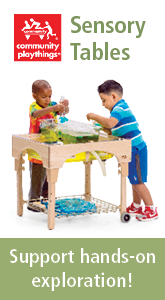Start Each Day with the Inspiration and Ideas You Need!
Exchange Every Day brings a brief, inspiring and informational message to your inbox 5 days a week, on a wide range of issues and ideas in early childhood and beyond. Join our community and expand your perspectives.
We are better together: Join our exchange of ideas in Exchange Every Day. Share your ideas, inspiration, information or resources in 250 words or less. Learn more and submit.
Subscribe to ExchangeEveryDay
Already a Member? ExchangeEveryDay is included in your membership plan.
Today’s Exchange Every Day
June 26, 2025
Real learning is not copying. That’s the wrong word. Copying is taking somebody else’s solutions. Learning is taking somebody else’s problems.
– Twyla Tharp, ChoreographerNurture your creativity and leadership with these upcoming professional development opportunities:
Online Events
June 26, 2025
Exchange Press
Engaging Exchange: A Conversation Focused on Connections Across Generations
July 2, 2025
Nature Explore
Ask a Nature Explore Educator: Fostering creativity in the outdoor classroom
July 3, 2025
All Our Kin
Grounding Your Coaching in the 3Rs
July 9, 2025
Early Childhood Investigations Webinars
How To Talk with Infants and Toddlers to Build Receptive and Expressive Language Development
July 10, 2025
CAYL
Head Start: History, Impact, and the Way Forward
July 15, 2025
Sarasota University
“Observation is Love!” with Kathy Leitch
July 15, 2025
ZERO to THREE
Infant Mental Health Training: What You Need to KnowJuly 16, 2025
Association for Early Learning Leaders
Self-Care for Directors
July 17, 2025
Famly
Get to know Famly: A live product tour
July 23, 2025
July 23, 2025
Becker’s
Designing with Purpose: Creating Environments Where Children ThriveJune 30, 2025
World Forum Foundation
In-Person EventsSeptember 15-18, 2025
ERS
ERS National Conference
Las Vegas, NV
September 15-18, 2025
National Head Start Association
Fall Leadership Institute
Washington, D.C.
October 8-9, 2025
ZERO to THREE
Learn Conference
Baltimore, MD
October 7-10, 2025
Division for Early Childhood
41st Annual International Conference
on Young Children with Disabilities and Their Families
Portland, OR
October 8-11, 2025
Council for Professional Recognition
Early Educators Leadership Conference
Orlando, FL
October 22-25, 2025
International Play Association
The Children’s Right to Play Conference
Louisville, KY
November 5-7, 2025
ELEA
Leadership Conference 2025
Cleveland, OH
November 19-22, 2025
NAEYC
Annual Conference
Orlando, FL
See more events, or share your event on our calendar.Share with the hashtag #ExchangeEveryDay









